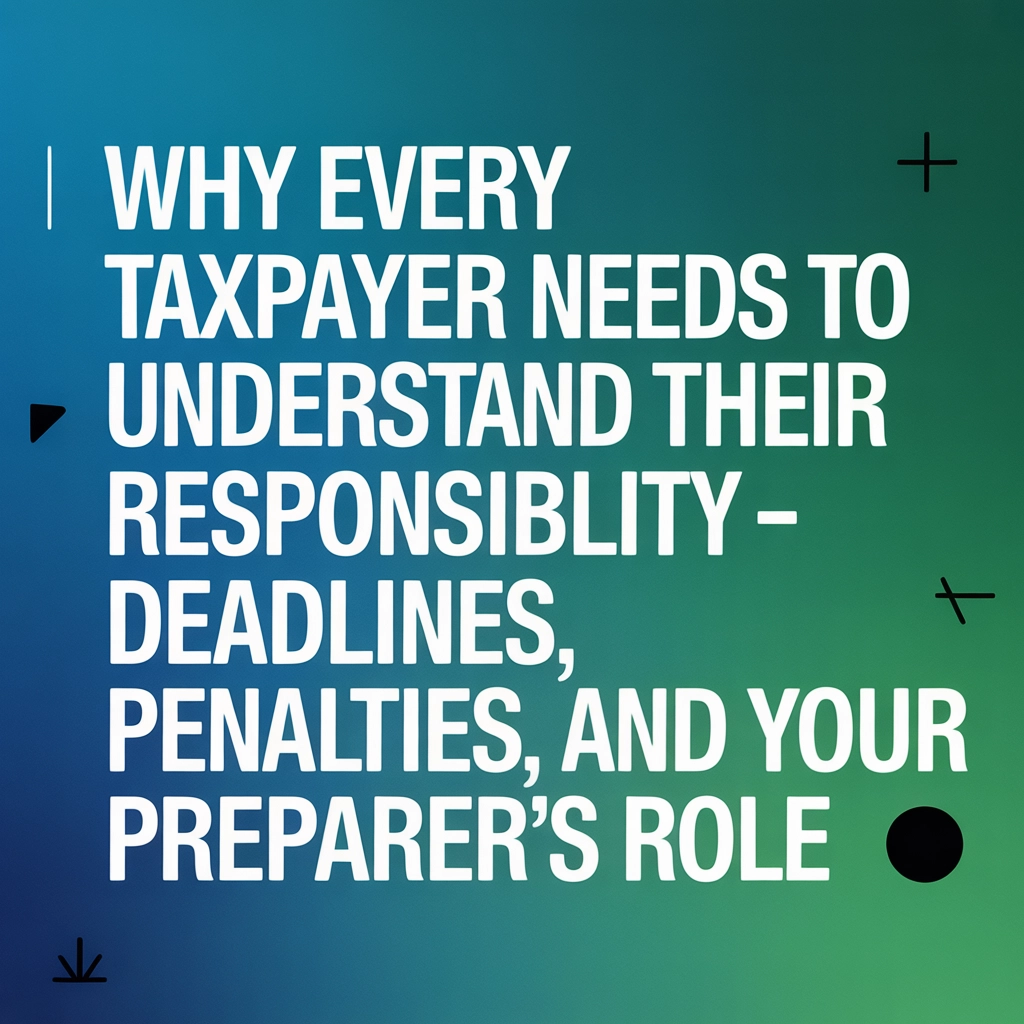Why Every Taxpayer Needs to Understand Their Responsibility
Why Every Taxpayer Needs to Understand Their Responsibility – Deadlines, Penalties, and Your Tax Preparer's Role

Are YOU on Top of Your Tax Game?
When it comes to taxes, there’s a big misconception floating around: “If my tax preparer messes up, that’s their problem.” Not quite! No matter who buttons up your return, it’s you—the taxpayer—who’s ultimately on the hook for getting everything right. That includes knowing the deadlines, double-checking the details, and dealing with any penalties if something goes sideways. Yep, even if the mistake wasn’t your fault.
Let’s break down why this matters, what deadlines you absolutely need to know, and where the lines (and guardrails!) are for your tax preparer.
Key Filing Deadlines All Taxpayers Should Know
Miss these dates and you could find yourself staring down some not-so-fun penalties. Here are the big ones, federally and in most states:
Federal Deadlines
Individual Income Tax Return (Form 1040):
April 15, 2025
(If April 15 falls on a weekend or holiday, the due date moves to the next business day.)Filing for an Extension:
You can file for a free automatic 6-month extension (using Form 4868), pushing your filing deadline to October 15, 2025.
But: This does not extend the deadline to pay any taxes due. Payment is still due by April 15!Quarterly Estimated Taxes (for self-employed & others):
April 15, 2025
June 16, 2025
September 15, 2025
January 15, 2026 (for 2025 tax year)

Common State Deadlines
Most states follow the federal due date for income tax filings, but some states march to their own drum. For example:
California, Utah, Colorado: Generally, April 15.
New York: Usually April 15, occasionally adjusted.
Washington State: No personal income tax, but business and sales tax returns are due by the 25th of the month following the reporting period.
Check your local Department of Revenue website for specifics—states can and do change deadlines!
What Happens If You Miss a Deadline?
Spoiler: The IRS (and state tax agencies) don’t just shrug it off. Here’s what you’re looking at:
Failure-to-File Penalty
5% of the unpaid taxes for each month or part of a month that your return is late, up to a max of 25%.
If you’re more than 60 days late, the minimum penalty is the lesser of $485 (for 2024 returns) or 100% of the unpaid tax.
Even if you’re due a refund, you should still file—otherwise, you could lose out on your money!
Failure-to-Pay Penalty
0.5% of the unpaid balance per month, up to 25%.
If you filed an extension on time and have an IRS payment plan, this drops to 0.25%.
Interest
Charged on top of penalties!
The IRS updates the rate quarterly (it changes, and it compounds).
Late State Tax Payments
Example: In Washington state, a late penalty starts at 9%, rises to 19% after a month, and hits 29% after two months. Ouch.
Penalties and interest add up fast—state agencies want their money, too.
Who’s Really Responsible? (Hint: It’s You.)
You might have a certified public accountant or trusted tax preparer on your team, but the IRS and the states see you as the “responsible party.” If something is misreported or missed—whether it’s by accident or oversight—you’re the one liable for:
Filing your return on time
Paying what you owe (even if it’s an estimate)
Responding to IRS or state requests
Paying any fines or penalties if there are hiccups
Moral of the story: You can’t hand off or outsource final accountaLate State Tax Payments
Example: In Washington state, a late penalty starts at 9%, rises to 19% after a month, and hits 29% after two months. Ouch.
Penalties and interest add up fast—state agencies want their money, too.
Deadlines Aren’t the Only Thing! What Else Are You Responsible For?
Here’s what you, as the taxpayer, should always keep an eye on:
Providing all your income information: W-2s, 1099s, investments, crypto, rental income, etc.
Double-checking personal info: Name, Social Security Number, bank account numbers for direct deposit.
Keeping supporting documents: Receipts, mileage logs, charity donation acknowledgments—hang onto these!
Reviewing your return: Check that everything looks right before you, well, sign on the dotted line.
Communicating with your tax preparer: Fast responses keep the process smooth and help prevent errors.

What Gets Tax Preparers in Trouble?
While it’s ultimately your job to be the squeaky-clean taxpayer, tax preparers do have responsibilities—under IRS and state law. Here’s what can put them on the IRS’s bad side:
“Willful or reckless” errors: Knowingly understating your tax or omitting income, or fabricating deductions.
Not signing returns: Paid tax preparers must sign your return.
Not providing Preparer Tax Identification Number (PTIN): Federal law requires it.
Failing to keep records: Preparers must keep copies or an electronic record of your return for three years.
Breach of confidentiality: Discussing or sharing your data, outside the law, is a big no-no.
Missed deadlines: If a preparer repeatedly files late, their credentials can be at risk.
If your preparer acts improperly, they can face fines, lose their ability to practice, or even face criminal charges. But remember: If their mistake leads to an incorrect return, you’re still on the hook for the tax, interest, and penalties, at least until it’s all fixed.

Can You Ever Get a Penalty Waived?
Life happens! If you truly have a good reason—like a natural disaster, major illness, or “reasonable cause” that’s out of your control—the IRS or your state tax authority might waive a penalty. But this isn’t guaranteed and you’ll usually need written proof. Some states offer penalty waivers if you’ve filed and paid on time for the last 24 months (check your local rules).
Your Ultimate Taxpayer Checklist
Know your deadlines—mark your calendar every year
Gather and organize all your paperwork well before tax season
Read through your return before e-filing or mailing
Pay your taxes on time, even if you can only make a partial payment (avoid the steepest penalties!)
Hire a professional you trust—but don’t hand over all control
Ask questions. If something looks off, speak up
Want a pro on your side? Learn more about how Bookkeeping Made Simple helps you stay stress-free and ahead of deadlines—explore our services.

Bottom Line
Tax time doesn’t have to be scary—but you can’t afford to take a hands-off approach. Know your deadlines, understand your real responsibilities, and work smartly with your preparer. It’s your signature on that return, and your wallet (or peace of mind) at stake.
Tax season got you sweating? Reach out to the team at Bookkeeping Made Simple for professional support, friendly reminders, and a partner who’s got your back through every deduction, deadline, and dollar.
Nothing in this post is tax advice; always consult a qualified pro for your specific tax scenario!
